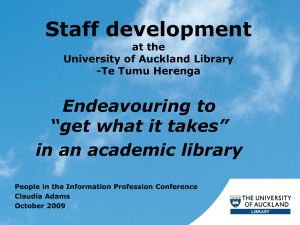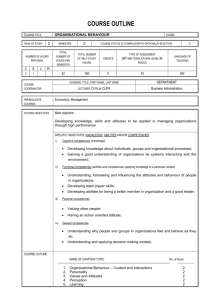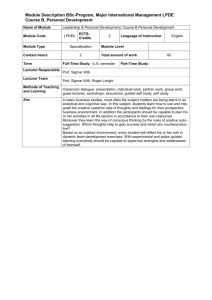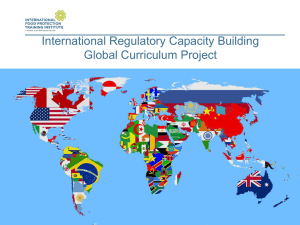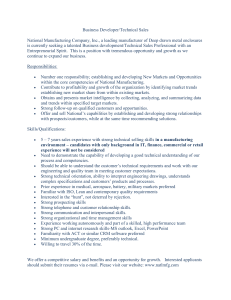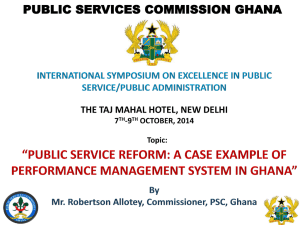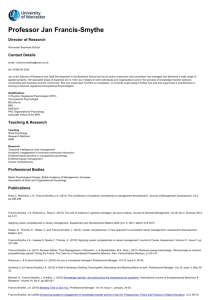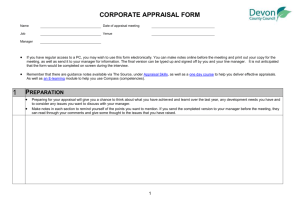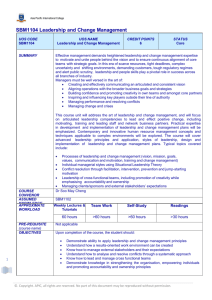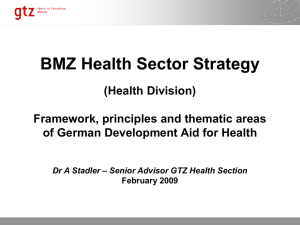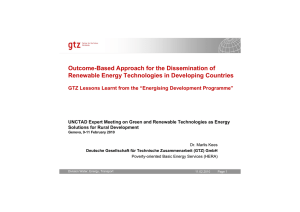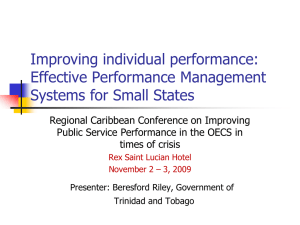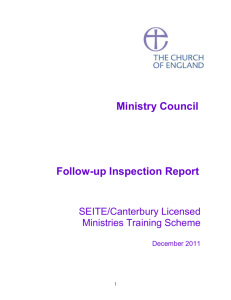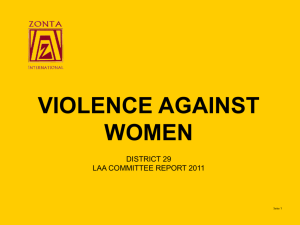docx - Fachhochschule St.Gallen
advertisement
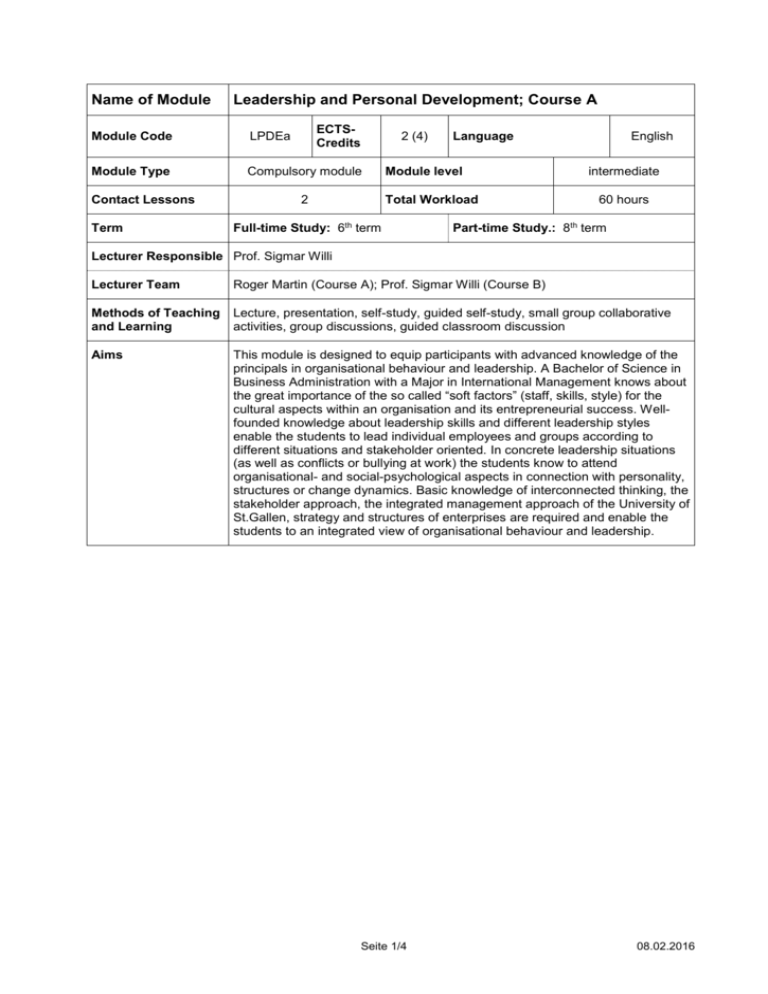
Name of Module Leadership and Personal Development; Course A ECTSCredits Module Code LPDEa Module Type Compulsory module Contact Lessons Term 2 (4) Language Module level Total Workload 2 Full-time Study: 6th term English intermediate 60 hours Part-time Study.: 8th term Lecturer Responsible Prof. Sigmar Willi Lecturer Team Roger Martin (Course A); Prof. Sigmar Willi (Course B) Methods of Teaching and Learning Lecture, presentation, self-study, guided self-study, small group collaborative activities, group discussions, guided classroom discussion Aims This module is designed to equip participants with advanced knowledge of the principals in organisational behaviour and leadership. A Bachelor of Science in Business Administration with a Major in International Management knows about the great importance of the so called “soft factors” (staff, skills, style) for the cultural aspects within an organisation and its entrepreneurial success. Wellfounded knowledge about leadership skills and different leadership styles enable the students to lead individual employees and groups according to different situations and stakeholder oriented. In concrete leadership situations (as well as conflicts or bullying at work) the students know to attend organisational- and social-psychological aspects in connection with personality, structures or change dynamics. Basic knowledge of interconnected thinking, the stakeholder approach, the integrated management approach of the University of St.Gallen, strategy and structures of enterprises are required and enable the students to an integrated view of organisational behaviour and leadership. Seite 1/4 08.02.2016 Module and Learning Professional Competencies: Objectives The students (Competencies) o explain essential management activities (including performance reviews, communication, goal agreements). o identify relevant management competencies in different situations, classify and develop their own management competencies. o explain the criteria and choice of an adequate leadership style in different situations (individual, teams, international cooperation). o describe and use methods and instruments necessary for human resources work concerning recruitment/ selection, personnel evaluation and development of staff. o develop solution approaches and organisational recommendations for work situations, considering motivation of employees, structure and culture of the company. o Know about the role and tasks of HRM and know how to deal with expatriats Methodological Competencies: The students o are able to manage an MbO-Process: develop specific tasks and goals for individual employees and reach an agreement with the employee o know about the interconnectedness of different social-psychological theories and the resultant importance of organisational culture in connection with concrete leadership situations of individuals and groups Personal Competencies: The students o are aware of their own values concerning their economic and social thinking; o are able to communicate and willing to develop these values during the examination of learning contents and argumentations with other students o show openness to critical statements of superiors and employees o are willing to reflect their own leadership skills and recognise their own strengths and weaknesses o know how to use their own leadership and motivation skills in a leading position of an organization Social Competencies: The students o are aware of their own values concerning ethical, economic and social questions and of their responsibility as a leader in an organisation o are able to communicate authentically and act in different business situations as a leader who assumes responsibility and duties to different stakeholders o are able to lead conflicts with the necessary assertiveness and empathy to the very best solution for the involved persons Seite 2/4 08.02.2016 Module Content / Learning Content Learning Block I: Leadership – basic questions and notion o Leadership as a part of corporate management o Leading by structures or people: indirect vs. direct leadership o Initiating activity as a essential characteristic of leadership Learning Block II: Framework of Leadership: modern conceptions of organization, corporate culture and human resource strategy o modern conception of organization & expectation on leadership o corporate culture Learning Block III: Theory of Leadership – List of statements about development of success or rather the effect of direct Leadership o Some determinants on success of Leadership o Trait-Theory o Behavioural theories of leadership o Situational leadership theory o Implicit Theories Learning Block IV: Leadership principles, in particular Management by Objectives (MbO) o A view over leadership principles o Management by Objectives o Management by Delegation (MbD) o Employee appraisal o Stages of an appraisal interview o Leading and working in teams o Definition o Development of performance o Performance of teams o Leading teams o Tools to lead teams Learning Block V: Personnel Management/ Human Resources Management o Activities of Human Resources Management o Recruiting o Assignment o Appraisal and Compensation o Aspects of international Personnel-Management Seite 3/4 08.02.2016 Module Structure Contact Studies (22 h) (14 x 90 minutes) Self studies (38 h) o Preparation and review of the lessons Teaching Materials o Homework o Prep reading o Preparation for the final exam o Northouse, P. G., Leadership: Theory and Practice (ISBN: 978-1412974882) Module Requirements Graded Performance Final exam for the whole module LPDE (Course A and course B): 120 min Compulsory Requirements Follow-up Modules None Seite 4/4 08.02.2016

